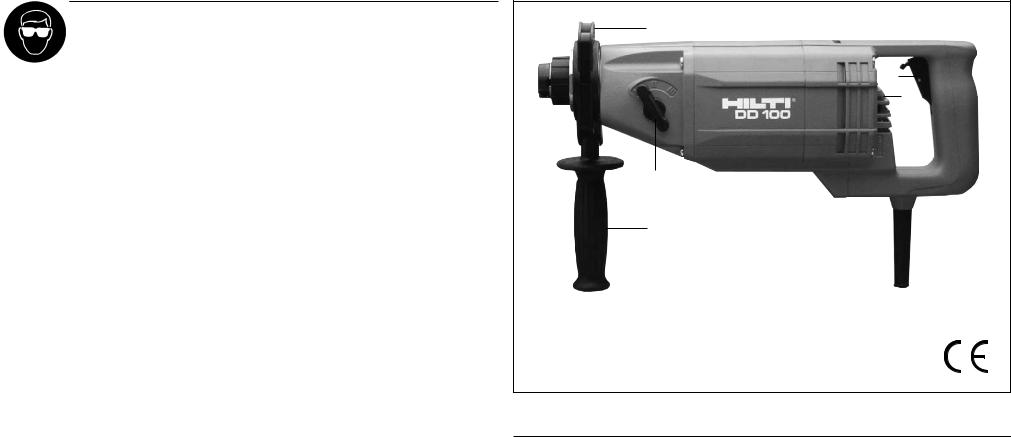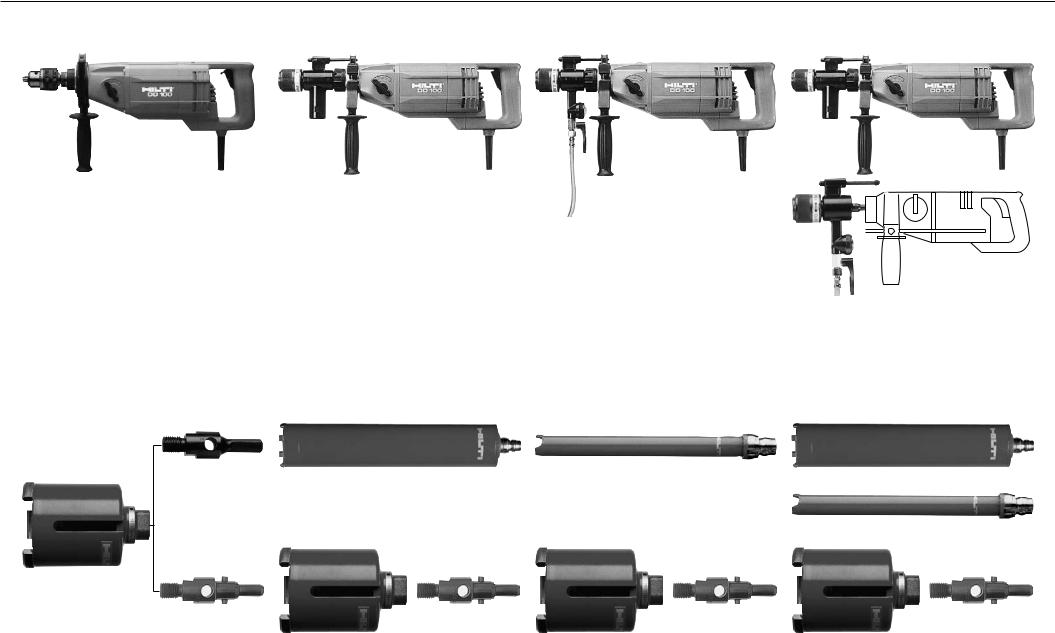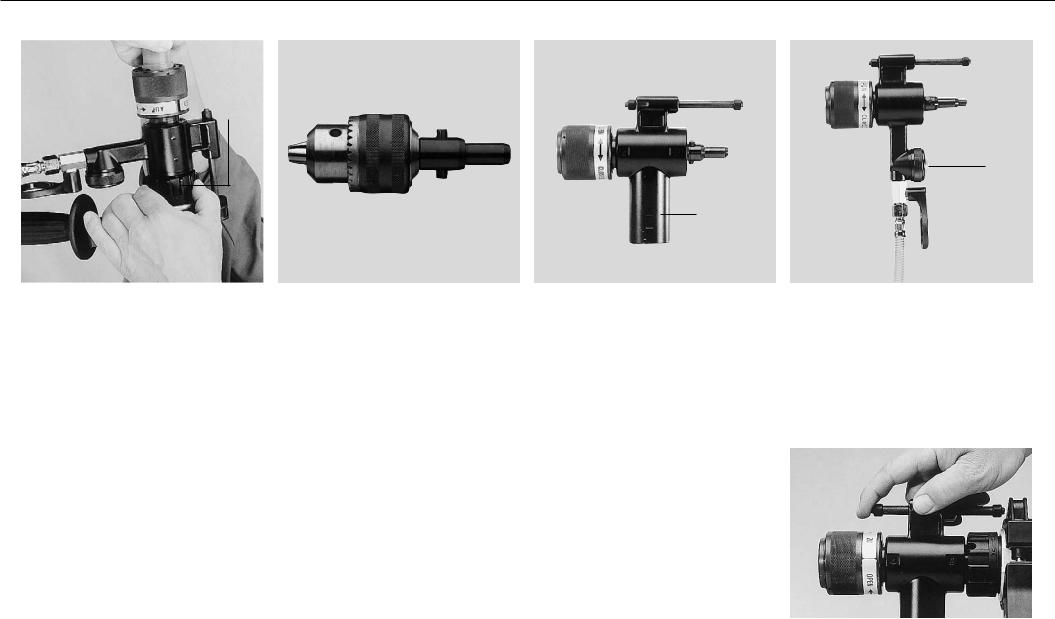Hilti DD100 Manual

Safety precautions
Caution: The following fundamental safety precautions must always be observed when using electric tools/machines as protection against electric shock, the risk of injury and fire hazards.
Please read and take note of these precautions before you use the tool/machine.
■1 Keep your place of work clean and tidy. Disorder where you are working creates a potential risk of accidents.
■2 Make allowance for influence from the surroundings. Don’t expose your electric tools/machines to rain. Don’t use electric tools/machines in damp or wet surroundings. Make sure the work area is well lit. Don’t use electric tools/ machines near inflammable liquids or gases.
■3 Always protect yourself against electric shock. Never touch grounding (earthing) parts e.g. pipes, radiators, cookers, ovens, refrigerators.
■4 Keep children away. Don’t let other persons touch the electric tool/machine or supply cord. Keep them away from your work area.
■5 Keep your electric tool/machine in a safe place. Electric tools/machines not in use should be kept in a dry locked-up place out of the reach of children.
■6 Don’t overload your electric tools/machines. You will do your work better and safer in the specified performance/rating range.
14
■7 Always use the right electric tool/machine for the job. Don’t use underpowered tools/machines or attachments for heavier duty jobs. Don’t use electric tools/ machines for work and purposes for which they are not intended, e.g. don’t use a hand-held circular saw to cut down trees or cut up branches.
■8 Wear suitable clothing. Don’t wear loose clothing or jewellery – they could be caught up in moving parts. When working outside, the use of rubber gloves and non-slip shoes is recommended. Wear a helmet or cap if you have long hair.
■9 Always wear protective goggles. If work causes dust, wear a mask as well.
■10 Don’t use the supply cord for any other purpose. Don’t carry the electric tool/ machine by the supply cord and don’t pull the plug out of the socket/receptacle by pulling the supply cord. Protect the cable from heat, oil and sharp edges.
■11 Secure the workpiece. Use a clamping device or vice to hold the workpiece. It is secured more reliably in this way than in your hand and you can then hold and operate your electric tool/machine with both hands.
■12 Don’t bend over too far when working. Avoid an unusual stance. Make sure that you are standing firmly and keep your balance at all times.
■13 Take good care of your electric tools/machines. Keep the drill bits, insert tools etc. sharp and clean so that you can do your work better, safer and more reliably. Observe the cleaning and maintenance regulations and
the instructions for changing drill bits, insert tools etc. Check the supply cord regularly and have it renewed by a recognized specialist if it is damaged. Check the extension supply cord regularly and, if it is damaged, replace it. Keep grips and side handles dry and free from oil or grease.
■14 Always pull out the plug from the mains if the electric tool/machine is not in use, prior to cleaning and maintenance work and when changing a drill bit, saw blade or insert tools of any kind.
■15 Never leave a key in place. Always check before switching on that the key or adjusting tools have been removed.
■16 Avoid any unintentional start-up. Never carry a plugged-in electric tool/machine with your finger on the switch. Always make sure that the switch is off when plugging the electric tool/machine into the main electric supply.
■17 If an extension supply cord is used outside, only use one which has been approved for the purpose and is correspondingly marked.
■18 Be attentive at all times. Keep your eye on your work. Remain in a sensible frame of mind and don’t use the electric tool/machine if you cannot concentrate completely.
■19 Check your electric tool/machine for damage. You must check the safety devices or damaged parts carefully for perfect functioning in keeping with the intended purpose before using the electric tool/machine further. Check whether the moving parts function properly, whether they aren’t sticking, whether
any parts are broken, whether all other parts work properly and are fitted correctly, and make sure that all other conditions which can influence operation and running of the electric tool/machine are as they should be. Damaged guards and protective devices and parts must be repaired properly by an authorized service workshop or replaced provided that nothing else is stated in the operating instructions. Damaged switches must also be replaced in the recognized service workshop. Never use electric tools/machines which cannot be switched on and off by the switch.
■20 Caution ! For your own safety’s sake, only use accessories and attachments which are specified in the operating instructions or in the respective catalogue. The use of accessories or insert tools or attachments other than those specified in the operating instructions can result in personal injury to you.
■21 Only have repairs carried out by recognized electrical specialists. This electric tool/machine complies with respective safety regulations. Repairs may only be carried out by an electrical specialist otherwise an accident hazard for the operator can exist.
■22 Connect dust extraction equipment. If devices are provided for the connection of dust extraction and collection facilities ensure these are connected and properly used.
Please keep these safety precautions in a safe place.
englisch

Contents |
DD100 basic unit |
|
|
DD100 basic unit |
15 |
||||
Versions with additional equipment |
16 |
||||
Assembly instructions/conversion |
17 |
||||
Drilling speeds |
18 |
||||
Water collector |
18+19 |
||||
Safety regulations |
20 |
||||
DD100 motor/technical data |
21 |
||||
Overload indicator |
22 |
||||
Aids for starting drilling |
23 |
||||
Accessories |
23 |
||||
Ground fault interruptor PRCD |
24 |
||||
Maintenance |
24 |
||||
|
|
|
|
|
|
|
|
|
|
|
|
Always wear ear |
Always wear pro- |
Always wear safety |
protectors. |
tective gloves. |
glasses. |
|
|
|
Noise and vibration
Typically the A-weighted noise levels of the tool are:
– sound pressure level: |
89 dB (A) |
– sound power level: |
102 dB (A) |
Wear ear protection. |
|
The typical hand-arm-vibration is below is 2,5 m/s2.
Do not use this product in any way other than as directed by these operating instructions.
When working with the machine, it must be held with two hands. Always make sure that you have a safe stance/ foothold.
Electronic switch (easy hole-starting)Side handle
Depth gauge ( not fitted)Overload indicator
Speed-change switch
Technical data
Weight (basic unit): |
|
Approx. 6,2 kg |
Dimensions: |
|
Approx. 440 115 155 mm |
Drill bit size range: |
dry |
16–152 mm dia. |
|
wet |
8– 42 mm dia. (hand held) |
|
|
8– 82 mm dia. (drilling rig) |
Chuck for core bits: |
|
Hilti quick-change DD-BI |
Chuck for dry-cutting core bits: |
Key-type chuck |
|
Before beginning work:
Please observe the enclosed safety precautions!
15

DD100 versions with additional equipment
DD 100-B |
DD 100-D |
DD 100-W |
DD 100-M |
Basic-version |
Dry-drilling version |
Wet-drilling version |
Multi-purpose (wet/dry) version |
Equipment supplied
● Machine |
● Machine |
● Machine with build-in ground fault interruptor |
● Machine with built-in ground fault interruptor |
● Key-type chuck |
● Extraction head with chuck |
● Water swivel witch chuck |
● Extraction head with chuck |
● Cardboard box |
● Plastic case |
● Water collector |
● Water swivel with chuck |
|
|
● Plastic case |
● Water collector |
|
|
|
● Plastic case |
Insert tool programme |
|
|
|
Universal |
|
Core bit for dry drilling |
Core bit for wet drilling |
|
|
|
|||
adaptor |
|
Core bit for dry drilling |
||
|
|
|
|
|
|
|
|
|
|
|
|
|
|
|
|
|
|
|
Core bit for wet drilling |
Socket cutters
DD100 adaptor |
DD100 adaptor |
DD100 adaptor |
DD100 adaptor |
Socket cutters |
Socket cutters |
|
Socket cutters |
16

DD100: Assembly and conversion
Re-equipping |
Key-type chuck |
Extraction head |
Water swivel |
|
|
|
|
To remove the chuck, first turn the locking ring ( ) until it clicks into place. When fitting the chuck, the drive pin must be inserted into the groove.
The chuck is secured by turning the locking ring as far as it will go.
Important: Due to the keyed fit, the water swivel cannot be fitted to the DD 100-D. Conversion of a DD 100-D or DD 100-B for the first time, for wet drilling (DD 100-W, DD100-M) must be carried out by a Hilti service centre.
Open the chuck as far as is necessary, and insert an insert tool with cylindrical, 3-flat or hexagonal shank(13 mm or 1/2 ). After pushing in the insert tool as far as it will go, tighten the chuck using the key provided.
Connection to vacuum cleaner: If a Hilti vacuum cleaner is used, no additional adaptor is necessary. Press the vacuum cleaner hose firmly into the extration head connection ( ). (See page 23 for adaptor for other vacuum cleaners.)
Note: Drilling without dust removal could permanently damage or destroy the diamond core bit.
Insert the core bit into the chuck, possibly turning it slightly until the longitudinal groove can be felt to lock in place. to remove the core bit, first slide back the locking sleeve and then pull out the core bit.
The water swivel is connected by way of a Gardena coupling.
The water supply valve ( ) can be regulated using the index finger ( ).The flow of water is displayed by the flow indicator.
Note: If wet-drilling core bits are allowed to run dry, they will become overheated, which could lead to destruction of the diamond segments.
Push the chuck rotation-prevention pin into the opening provided.
17
